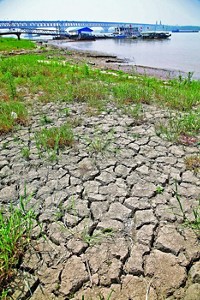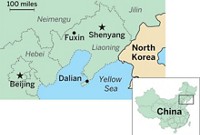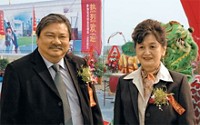Advertisement
Grab your lab coat. Let's get started
Welcome!
Welcome!
Create an account below to get 6 C&EN articles per month, receive newsletters and more - all free.
It seems this is your first time logging in online. Please enter the following information to continue.
As an ACS member you automatically get access to this site. All we need is few more details to create your reading experience.
Not you? Sign in with a different account.
Not you? Sign in with a different account.
ERROR 1
ERROR 1
ERROR 2
ERROR 2
ERROR 2
ERROR 2
ERROR 2
Password and Confirm password must match.
If you have an ACS member number, please enter it here so we can link this account to your membership. (optional)
ERROR 2
ACS values your privacy. By submitting your information, you are gaining access to C&EN and subscribing to our weekly newsletter. We use the information you provide to make your reading experience better, and we will never sell your data to third party members.
Business
Power Outages Hit Chinese Production
Chinese firms' ability to deliver promptly and cheaply is affected by electricity shortages
by Jean-François Tremblay
September 27, 2004
| A version of this story appeared in
Volume 82, Issue 39
It's never been easy doing business in China. And it became harder this summer when the country started to struggle with electricity shortages--shortages that have had a pervasive impact on China's chemical industry.
Whereas China used to be ultracompetitive in the supply of certain chemicals, prices for many items have risen to levels offered by overseas firms. Chinese producers used to be known for their promptness in executing orders, but they now often deliver late. And companies that went to China to conduct research have not been able to fully capitalize on the low cost of Chinese scientists as blackouts periodically made work impossible at their labs this past summer.
Ajay N. Taskar, a Mumbai-based consultant who sources aroma chemicals and other materials from China on behalf of Indian clients, says it's become nearly impossible for him to get hold of phenyl ethyl alcohol, a material that is often used in the perfume and pharmaceutical industries.
"We were able to get PEA from China until about five months ago," Taskar says. There are other producers in the U.S. and Japan, he adds, but they are either sold out or selling at a 75% premium over what the Chinese used to offer. Tianjin Freeworld Industry, a leading Chinese producer of phenyl ethyl alcohol, did not respond to a request for comments.
ScinoPharm, a Taiwan-based manufacturer of active pharmaceutical ingredients, sources drug intermediates from China and operates a research lab in Kunshan, a city near Shanghai. ScinoPharm's executive vice president, Hardy W. Chan, who spends part of the year at the Kunshan site, says power was cut to the lab three out of every seven days last summer.
As recently as four years ago, top officials in China were concerned about the country's apparent glut of power generation capacity. That the Chinese economy would grow fast enough to outstrip supply in just a few years came as an unpleasant surprise. Last year alone, power consumption in China jumped more than 15%. Electricity consumption is highest in the summer, owing to sweltering temperatures in Shanghai, Wuhan, Nanjing, and other major cities.
THE SHORTAGES, however, are unlikely to last beyond 2007. Fearful that the lack of power could harm economic progress, the Chinese government last year lifted investment restrictions in the power industry. This has resulted in a power plant construction boom with few precedents.
Power plants, mostly coal-fired, are under construction throughout China, which is already the world's second largest electricity producer. Moreover, the giant Three Gorges Dam, the world's largest hydroelectric project, will add 15 generators to the 11 now in operation on the Yangtze River near Yichang when work is completed in 2009.
Even over the next two or three years, many Chinese chemical producers will be relatively unaffected by power outages. Some have installed backup generators. Others have set up their facilities in industrial parks that boast their own power stations. One purchasing manager at a major chemical company that sources from China adds that most Chinese suppliers will continue shipping to their best customers--those who settle payment promptly--even when power outages are affecting normal production.
Kenichi Tokunaga, head of planning at Mitsui & Co. subsidiary Beta-Chem, says his company has had relatively few difficulties sourcing from China, even during the past summer. This may be the result of typical Japanese cautiousness. As part of their due diligence process, Beta-Chem executives routinely ask prospective suppliers in China where they get their power from. The company sources many of its raw materials from China, turning them into advanced intermediates or pharmaceutical ingredients at plants in Japan.
China's power shortages highlight the teething pains of a country that has been growing at a frantic pace since the mid-1990s. This pace cannot be sustained, a source tells C&EN. Too many plants producing all sorts of goods are being built. The number of Chinese households that own air conditioners, refrigerators, and washing machines has been growing too rapidly for electricity production to keep pace. In the past few months, the price of steel in China has rocketed, considerably increasing the cost of building plants in the country. The low cost of plant construction has been one of the main factors behind China's ability to produce goods cheaply.
Chinese companies have made great progress over the past few years in boosting sales and establishing their credibility internationally. But the power shortages will hamper their efforts to advance from the position of alternate to preferred supplier.





Join the conversation
Contact the reporter
Submit a Letter to the Editor for publication
Engage with us on Twitter